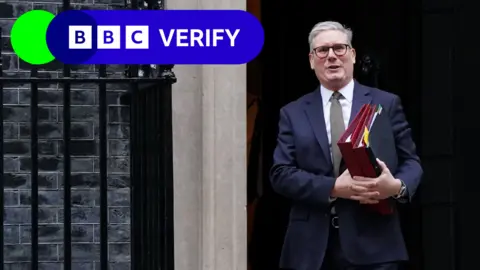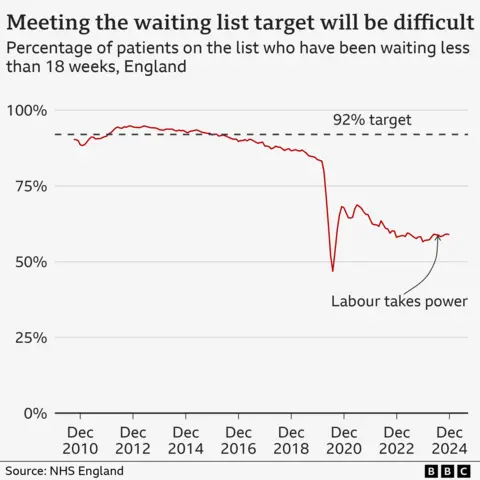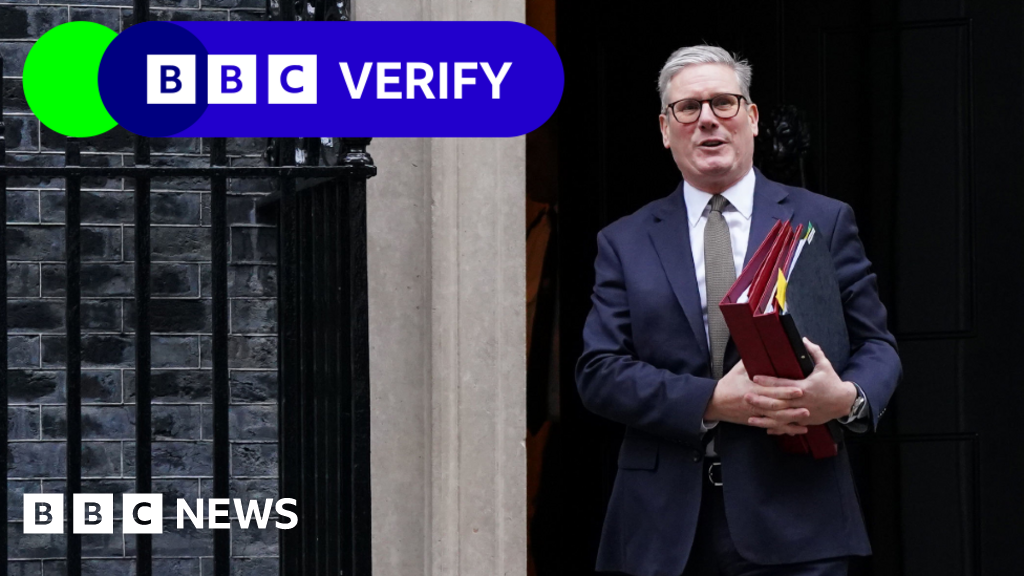BBC Verify
 BBC
BBCIn December 2024, Keir Starmer outlined a “plan for change” in a speech and set targets in key areas.
He said they were “measurable milestones that will also give the British people the power to hold our feet to the fire”.
BBC Verify looks at how the government is getting on with these pledges.
The economy
Starmer made a pledge to increase the amount of money that households have.
The government is using several measures to track this.
The first is GDP per head – that’s the size of the economy divided by the population.
It has not been performing well since Labour came to office, falling by 0.3% between July and September 2024 and another 0.1% in the last three months of the year.
Starmer is also planning to measure this by region, promising it will rise in every region of the UK.
His other measure is real household disposable income (RHDI) per person. This is what people have left of their pay and benefits once they have paid tax.
Between July and September, RHDI per head was unchanged from the previous three months.
In October, the Office for Budget Responsibility (OBR), which does the government’s forecasts, predicted that RHDI per person would rise by around 0.5% per year over this Parliament.

According to calculations by the Resolution Foundation, a think tank focused on living standards, that would be a slightly better performance than the 0.3% average growth in RHDI per person in the previous Parliament.
But it would be worse than just about every other Parliament for decades.
When will we know? RHDI figures come out about three months after the end of each quarter of the year. GDP per capita figures are published about six weeks after the end of each quarter. Regional GDP per capita is only released once a year, about 16 months after the end of the year it measures.
The NHS
The prime minister highlighted an existing target for the NHS in England that 92% of patients waiting for planned treatment should be seen within 18 weeks of being referred.
It was a Labour manifesto pledge and the government has promised to achieve it by 2029.
The latest NHS data shows that in December 2024 only 58.9% of patients due for procedures were seen within 18 weeks.
When Labour took power in July, the share was 58.8%, so it has barely changed.
The last time the 92% target was hit was November 2015.

To help fund this, Chancellor Rachel Reeves increased the inflation-adjusted day-to-day cash resources of the health department by 3.8% in both 2024-25 and 2025-26 in her Autumn Budget.
When will we know? Waiting list figures come out about six weeks after the end of a month.
Crime
The government has re-committed to its manifesto pledge to hire 13,000 additional neighbourhood police officers, volunteer special constables and Police Community Support Officers (PCSOs), who work with officers but do not have all the same powers.

BBC Verify has asked the Home Office for the breakdown of these 13,000 officers – and how many will be new – but it did not respond and the government document does not set it out.
It was asked in Parliament in January and said it would “work with police forces on the mix of roles” and that it would “vary from force to force”.
When will we know? The workforce figures for the year to the end of March come out each July, although they do not currently break down how many special constables are in neighbourhood roles.
Education
 PA
PAThe government pledged to raise the proportion of children in England who are “ready for school” at the age of five, to 75% by 2028.
That means they will have a “good level of development” in the Early Years Foundation Stage assessment, which is based on teachers’ assessments in areas such as language, personal, social and emotional development, and maths and literacy.
Official data from the Department for Education suggests that in 2023-24, 67.7% of children in England had a good level of development.
This was up slightly from 67.2% the previous year.
When will we know? The figures for the school year 2027-28 will come out in November 2028.
Housebuilding
Also in line with Labour’s manifesto, Starmer recommitted to building 1.5 million net additional dwellings in England over the course of the Parliament.
At a constant annual rate, that would equate to 300,000 per year,

The most recent official data shows that 221,070 net additional dwellings were delivered in 2023-24, a decline of 6% on the previous year.
Labour is bringing in new housing targets for local councils in England, which the previous government dropped and is reforming planning laws to try to accelerate building.
But many housing experts remain sceptical about the feasibility of Labour’s target given the lack of affordability of new housing, which has put off many buyers and deterred private developers from investing.
Official data also shows that the number of housing projects given the go-ahead by councils in England reached a record low in the final months of the last government, mainly because of a decline in applications from builders.
When will we know? Figures for the year to the end of March come out in November.
Clean power
In November 2023, a Labour press release talked about “leading the world with 100% clean power by 2030”.
The party’s election manifesto pledged “zero-carbon electricity by 2030”.
Starmer now says the government will achieve at least 95% clean power by 2030.
The prime minister was questioned repeatedly about whether this represented a change in the target but denied this.
The National Energy System Operator (NESO), the government’s independent system planner and operator for the energy transition, last month defined clean power as including less than 5% of generation from gas in a typical year.
It concluded in November 2024: “it is possible to build, connect and operate a clean power system for Great Britain by 2030, while maintaining security of supply”.
However, it added that achieving this would be “at the limit of what is feasible”.
When will we know? Figures for the proportion of electricity coming from low carbon sources come in the Energy Trends publication on the last Thursday of each quarter of the year, giving figures for the previous quarter.
Additional reporting by Daniel Wainwright, William Dahlgreen, Mark Poynting and Gerry Georgieva.





